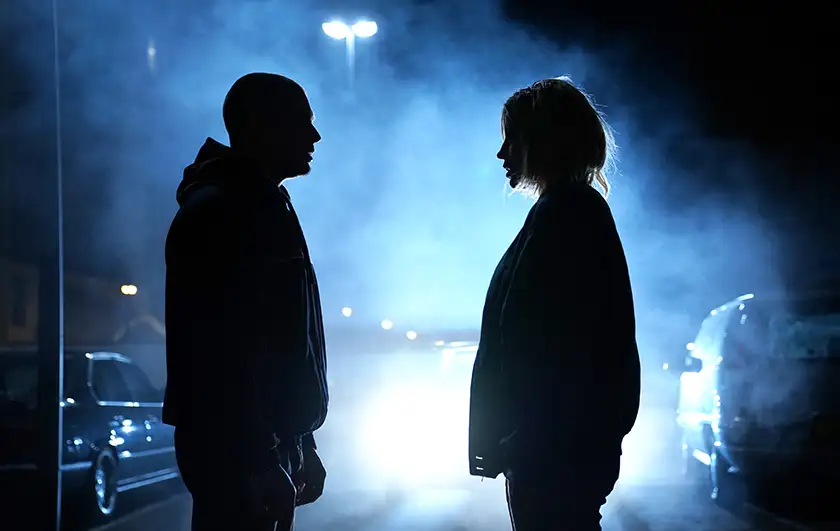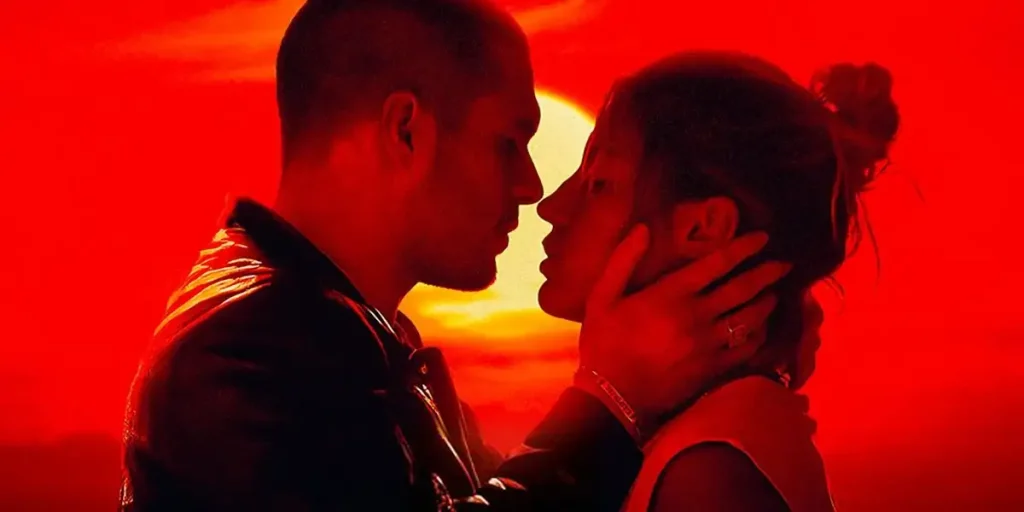Gilles Lellouche employs all the stylistic flourishes he can in Beating Hearts (L’Amour Ouf), distracting us from the egregious clichés the movie bathes in for almost three hours.
Director: Gilles Lellouche
Genre: Crime, Romance, Drama
Run Time: 166′
Canadian Release: January 1, 2025
U.S. Release: TBA
U.K. Release: TBA
Where to Watch: In Canadian theaters
After one of the most empathetic and respectful visualizations of depression and loneliness in a movie with Sink or Swim (Le Grand Bain), actor Gilles Lellouche returns to the director’s chair to discuss all things love with Beating Hearts (L’Amour Ouf). Clocking in at 160 minutes, the film is told in two parts, first representing the burgeoning romance between Clotaire (Malik Frikah) and Jackie (Mallory Wanecque).
In this section, the two are presented as polar opposites. One is a rebellious bad boy with an appetite for danger who slowly walks into a life of violence by working with a ruthless crime lord known as La Brosse (Benoît Poelvoorde). The other is an upper-middle-class girl who follows a strict studying structure to gain a financially stable yet unfulfilling future.
The second part occurs after twelve years have passed, with the two protagonists (now played by Adèle Exarchopoulos and François Civil) living separate lives. Clotaire has recently been freed from prison after being framed for a crime he did not commit and longs to return to the love of his life. However, Jackie has married Jeffrey (Vincent Lacoste), a wealthy director of operations of a car rental company, who can give him the financially stable life her father (Alain Chabat) has always desired for her. For over twelve years inside, Clotaire only had Jackie in his mind and even listed 457 terms that would best describe her (that’s quite specific, but decidedly Lellouche).
But he’s devastated upon learning that she has married and seemingly forgot the time spent with him as if it was a bad part of her life. However, when Jackie ultimately learns that Clotaire visited her father, strong feelings immediately come crawling back, leading her to question whether or not the life she currently has with Jeffrey is worth it after all. It’s a classic “forbidden love” story unconventionally told, containing some of the most inventive camerawork seen in the post-digital era. In almost three hours, Lellouche experiments with so many stylistic flourishes that it may prove overwhelming for people unfamiliar with his maximalist directorial style.

That’s why viewing Sink or Swim may be helpful as a primer for the even more flashy Beating Hearts and in understanding how Lellouche operates his films as purely visual stories. Representing the pain of isolation in a movie is extremely difficult via dialogue, which is why Mathieu Amalric’s Bertrand speaks few words throughout Sink or Swim’s 122 minutes. Instead, it’s all about how cinematographer Laurent Tangy’s camera communicates with the actors’ introspective performances and how it informs the audience of their psychological shift.
In Beating Hearts, Lellouche reunites with Tangy and pushes the visual imprint he created in Sink or Swim to the extreme. It begins with a quasi-musical opening, where each shot (and movement performed by the actors) is rhythmically and symmetrically structured. Its style then evolves by employing split diopters, wipes, crossfades, superimpositions, crash-zooms, and even bizarre camera placements to make the story feel more immersive. Such scenes include a young Clotaire slightly breaking the fourth wall by holding the camera and repositioning it, a camera placed inside a moving box, or a scene shot entirely in first-person view, though the latter isn’t as nearly impressive after seeing RaMell Ross’ Nickel Boys. Still, there’s no shortage of formal innovation inside the film’s gargantuan runtime.
There’s even a ‘song and dance’ sequence (because why not?) when Jackie and Clotaire realize they may be in love. Through the electrifying sounds of The Cure’s “A Forest,” the two express their blossoming desires in ways they cannot say to each other with words. Jackie knows following Clotaire’s path will only bring her pain, while Clotaire is so deep into La Brosse’s criminal enterprise that he may never crawl away from it. Yet, they can’t help but feel something they may never fully be able to share together. It’s one of the most profoundly moving sequences of Beating Hearts because it’s one of the few that deepens its central narrative arc more than the clichés it boxes the protagonists in.
Yes, it’s a technically immaculate film and one whose musical needle drops, like in Sink or Swim, enhance many sequences (a montage punctuated by The Alan Parsons Project’s “Sirius” is a significant highlight). However, it feels as if Lellouche and co-writers Audrey Diwan, Ahmed Hamidi, and Julien Lambroschini, who adapt Neville Thompson’s “Jackie Loves Johnser OK?”, use this bold and unique formal offering to distract audiences from the paper-thin character development and story whose entire construction is based on one platitude after the next.
We can never peer into these characters because their arcs seem telegraphed from the start. Clotaire lives in danger, while Jackie gets a taste of this adrenaline rush and becomes far more rebellious than she was. When she eventually settles for a stable life with Jeffrey, it’s easy to figure out that his controlling nature (which we can perceive from their first meeting: he never wants to let her go) will be revealed. This leads to a disturbing abuse scene that feels cruelly exploitative, gratuitous, and particularly hard to stomach, especially after so much senseless violence that was already showcased in Clotaire’s criminal life.
Still, Exarchopoulos and Civil remain committed to their respective characters, but Mallory Wanecque and Malik Frikah reveal themselves as breakout stars. Their romance is far more convincing than when the adult characters eventually reunite and fall in love again. They were not miscast but instead misdirected by an individual who cares more about blowing the audience away with his aesthetics than serving that visual style as the foundation for the romance to develop in unpredictable directions. Without a strong image, your movie has nothing to offer. That’s a given, especially in a day and age where the flat images of television have become the norm in cinema. However, when you don’t imbue meaning to your strong images, it only feels like a distraction.
The only time Lellouche decides to supplant the tired tropes that plague many romantic dramas is in reversing audience anticipation with the film’s ending. The movie begins with the final moment of Clotaire’s life, which may not be a great narrative decision if you ask someone to keep watching for the next two and a half hours by revealing how this love story ends right off the top. However, as the film progresses and Lellouche goes back to this specific scene, we realize what could’ve happened if Clotaire did not remember the one thing guiding his impulsive decisions: love.
These final moments are thrillingly subversive and move away from the predictable conclusion that most saw coming, which feels like a refreshing change of pace for a sub-genre that has grown staler over time. But it isn’t enough to save Beating Hearts from being anything more than an admirable formal exercise, with a great cast of actors giving impassioned performances, without ever overcoming its dull and clichéd screenplay.
I’ve always thought that, in cinema, images are more important than dialogue. This is evidently illustrated in Lellouche’s previous directorial effort. However, images alone will do nothing. When it marries everything on screen, accompanies the actors, gives a sense of musicality to Jon Brion’s score, and punctuates its in-your-face editing, the movie has a chance to stand the test of time. When it’s a vacuous (and overlong) display of showmanship without anything else to offer, the only thing a person will say when they get out of the cinema is one very loud and exasperating oufffffffffff…
Beating Hearts (L’Amour Ouf): Movie Plot & Recap
Synopsis:
The rebellious Clotaire, who begins to work his way up in the criminal underworld, falls in love with the studious, upper-middle-class Jackie. However, after he is jailed for a crime he did not commit, Jackie moves on and chooses a more stable life instead. When Clotaire is freed from prison after serving a twelve-year sentence, his heart is still close to Jackie, who, we find out, has never truly moved on from her teenage romance.
Pros:
- An incredible sense of style and real demonstration of formal innovation from director Gilles Lellouche
- Solid performances from Adèle Exarchopoulos and François Civil, but Mallory Wanecque and Malik Frikah steal the show.
- A great supporting cast of A-listers doing their best: Benoît Poelvoodre, Alain Chabat, Raphaël Quenard, and Jean-Pascal Zadi.
- The ending supplants the telegraphed tragedy that this story was likely leading to.
Cons:
- A script bathed in one egregious cliché after the next.
- The characters are thinly developed beyond the tropes they are stuck in.
- Jackie’s story concludes with a sequence of gratuitous, almost exploitative domestic violence that is very difficult to stomach.
- The film is nothing more than a vacuous exercise in style without any substance to support its show-stopping photography.
- In an early flashback scene, garish uses of de-aging are employed on Alain Chabat’s character, who could’ve been left on the cutting room floor.
Beating Hearts (L’Amour Ouf) was released in French cinemas on October 16, 2024 by Studiocanal and in Canadian theaters on January 1, 2025 by VVS FILMS.

